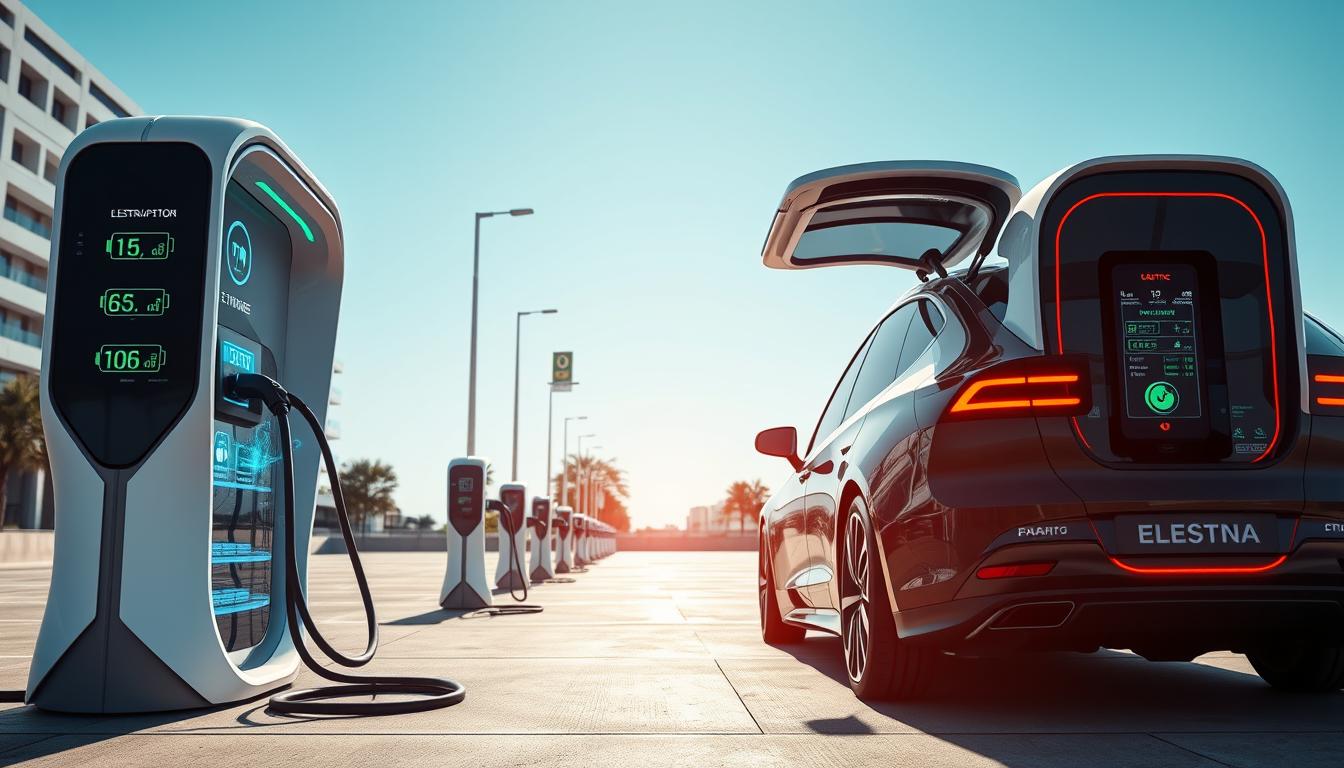How Long Does an Electric Car Battery Last?
The electric vehicle (EV) market is growing fast. Many people wonder, “How long will my electric car’s battery last?” This is a big question for those thinking about switching to eco-friendly cars. We’ll explore what affects electric car battery life, so you know what to expect.
Factors Affecting Electric Car Battery Life
The life of an electric car battery depends on several things. These include the car’s range, how many times it’s charged, and the temperature. The battery management system is key in keeping the battery working well. Let’s look at how these factors affect your EV’s battery life.
Driving Range and Charging Cycles
The range of an electric car is tied to its battery size. As the battery wears out, the car can travel less on one charge. The number of times you can charge the battery before it starts to lose power is also important.
Charging the battery fully and avoiding fast charging too much can help it last longer. Keeping the battery’s charge level in a good range also helps it last longer.
Temperature Impact on Batteries
The temperature where you drive your electric car matters a lot. Very hot or cold temperatures can make the battery wear out faster.
High temperatures can make the battery’s chemicals react more, leading to faster loss of power and less efficient charging. On the other hand, cold temperatures can make the battery work less well, affecting how far you can drive.
To deal with temperature issues, electric cars have advanced battery management systems (BMS). These systems keep the battery’s temperature right, helping it last longer.
“Proper temperature management is crucial for maintaining the health and performance of an electric car’s battery.”
Lithium-Ion Battery Longevity
Lithium-ion batteries power electric vehicles and have unique traits that impact their durability. As electric cars become more popular, knowing how long these batteries last is key for both buyers and the industry.
The lifespan of lithium-ion batteries is influenced by how well they hold a charge over time. These batteries pack a lot of energy but can lose some with each use. Taking good care of them can make them last longer, saving money and hassle for electric car owners.
Temperature also plays a big role in how long lithium-ion batteries last. Very hot or cold temperatures can damage the battery faster, shortening its life. Keeping the battery in the right temperature can help it last longer.
Recycling lithium-ion batteries is also vital. As more electric cars are retired, recycling them will become more important. It’s not just good for the planet; it also helps recover valuable materials, supporting the industry’s green goals.
| Battery Characteristic | Impact on Longevity |
|---|---|
| Charge/Discharge Cycles | Gradual capacity loss with each cycle |
| Temperature | Extreme temperatures accelerate degradation |
| Battery Recycling | Crucial for sustainability and material recovery |
Understanding what affects lithium-ion battery longevity helps us make better choices for electric vehicles. It’s a step towards a greener, more sustainable future for transportation.
How Long Does an Electric Car Battery Last?
The lifespan of an electric car battery varies a lot. It depends on several factors. Knowing how EV batteries degrade and the importance of the battery management system (BMS) helps figure out how long they last.
Electric Vehicle Battery Degradation
Electric car batteries lose some capacity over time, known as degradation. Driving habits, charging practices, and the environment affect how fast they degrade. Modern lithium-ion batteries in EVs usually keep 70-90% of their original power after 8-10 years.
Battery Management System
The battery management system is key to a long-lasting EV battery. It watches the battery’s charge, temperature, and more. This ensures the battery stays safe and works well. The BMS helps slow down degradation, making the battery last longer.
“With proper care and maintenance, electric car batteries can last for many years, providing reliable power for your vehicle.”
Knowing what affects battery degradation and the BMS’s role helps EV owners. They can make choices to extend their battery’s life.
Battery Replacement Cost
The battery is key for electric cars, ensuring they run well and go far. But, batteries can wear out, needing to be replaced. This can be pricey, so knowing the costs is crucial.
The cost to replace an electric car battery varies. It can be between $3,000 and $15,000, depending on the car. The battery’s size, type, and warranty also play a part in the price.
For instance, replacing a Nissan Leaf battery costs about $5,500. A Tesla Model S battery replacement can cost between $10,000 and $15,000. It’s smart to check the expected costs for your car model before buying.
There are ways to lower the cost of replacing a battery. Many car makers offer long warranties on their batteries. This can cover the cost if the battery fails early. Some also have battery leasing plans, where you pay a monthly fee instead of owning the battery.
Keeping your battery in good shape can also help. Avoiding extreme temperatures and following the right charging methods can make your battery last longer. This might delay when you need to replace it.
Knowing the battery replacement cost and the options available helps us make better choices. This ensures owning an electric car is both smooth and affordable.
Extending Battery Life: Tips and Best Practices
Keeping your electric car’s battery in top shape is key to its performance and value. There are many ways to make your battery last longer. Let’s explore the best ways to charge and manage temperature.
Proper Charging Habits
Good charging habits are vital for your battery’s health. Here are some tips:
- Don’t let the battery go all the way down before charging. Try to keep it between 20% and 80%.
- Use fast charging sparingly. Slow, overnight charging is better for your battery.
- Unplug your car at 100% to avoid overcharging, which can harm the battery.
Temperature Management
Keeping your battery at the right temperature is crucial. Extreme heat or cold can hurt its performance and life. Here’s how to keep it in the best range:
- Always park in a shaded or covered spot to protect from sun and heat.
- Use the pre-conditioning feature to heat or cool the car before unplugging. This ensures the battery starts at a good temperature.
- Don’t leave your car in extreme temperatures for too long, like in a hot or cold garage.
By following these tips for charging and temperature, you can make your electric car’s battery last longer. Enjoy its benefits for many years.
Conclusion
The lifespan of an electric car battery is complex. Many factors influence it, like driving range, charging cycles, and temperature. The battery management system also plays a big role.
By understanding these elements, we can extend our EV’s battery life. This ensures it keeps performing well for many years.
Are you wondering about electric car battery longevity? Or how to prevent battery degradation? Knowing about lithium-ion batteries and their replacement costs is key.
Proper charging and temperature control are crucial. They help us get the most out of our electric car’s battery. This makes driving more sustainable and cost-effective.
The electric vehicle market is growing fast. Knowing what affects battery lifespan is more important than ever. Keeping up with battery recycling and new technologies helps us make better choices.
This way, we contribute to a greener future for transportation.
FAQ
How long does an electric car battery last?
The life of an electric car battery depends on several things. These include how far it can go on a charge, how many times it’s charged, and the temperature. Generally, an electric car battery lasts 8-12 years or goes up to 200,000 miles before needing a new one.
What factors affect electric vehicle battery life?
Several factors can affect how long an electric car battery lasts. These include the battery’s range, how many times it’s charged, and extreme temperatures. The battery management system is key in keeping the battery running well for longer.
How does lithium-ion battery longevity compare to other battery types?
Lithium-ion batteries, used in most electric cars, last longer than other types. With the right care, they can last 8-12 years or more. Recycling these batteries is also important to make the most of them.
How much does it cost to replace an electric car battery?
Replacing an electric car battery can cost a lot. Prices range from $3,000 to $15,000 or more. This depends on the car model and battery size. Costs can change due to technology improvements and economies of scale.
How can I extend the life of my electric car’s battery?
To make your electric car’s battery last longer, charge it right. Avoid fast charging too often and keep the charge level in a good range. Also, manage the temperature well during driving and charging to keep the battery healthy.



